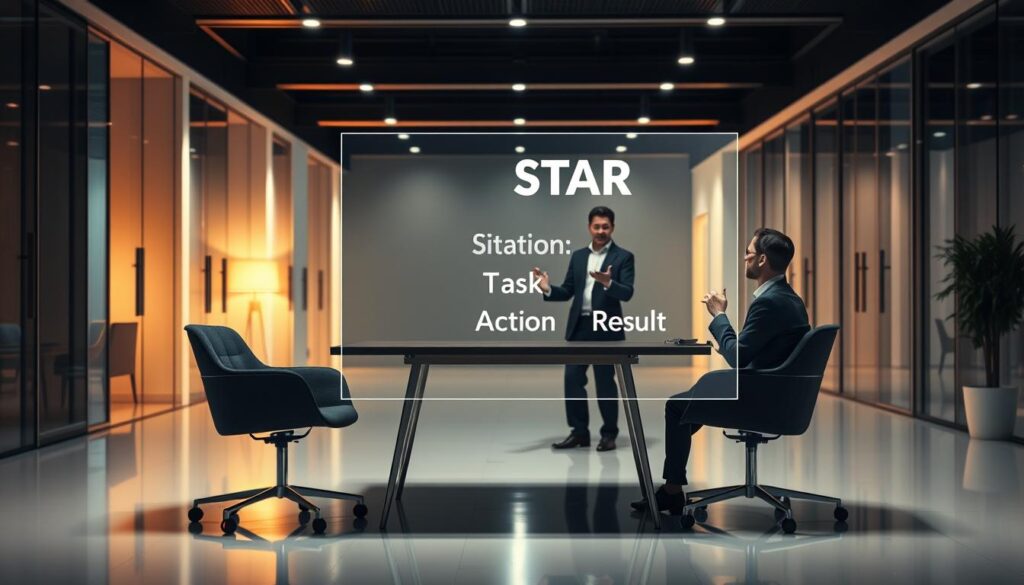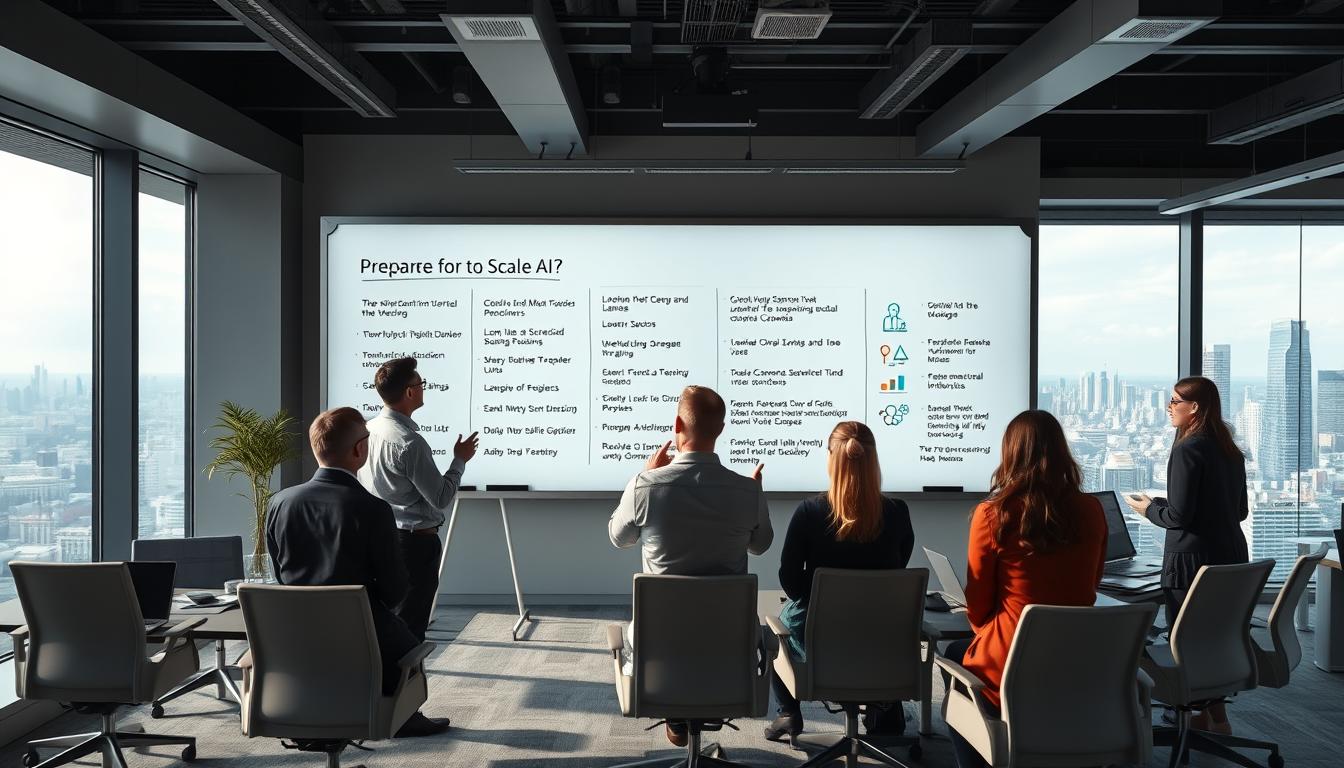Did you know that 73% of companies now use AI-powered screening tools during their hiring process in 2025? This big change means old ways of getting ready don’t work anymore.
Today, employers look for more than just skills. They want people who show emotional intelligence, adaptability, and real human connection. The job market now needs a full plan for growing professionally.
RoboApply knows about these new challenges. Our platform uses top AI tech and tested job interview prep methods. You get tools for making resumes, improving for ATS, and getting personal coaching.
Success means knowing both technical interview skills and soft skills. The right prep turns nervousness into confidence. You’ll learn strategies that work in today’s tough job market.
Key Takeaways
- Modern hiring processes rely heavily on AI screening and assessment tools
- Employers prioritize emotional intelligence alongside technical competencies
- Comprehensive preparation includes both hard and soft skill development
- Technology platforms like RoboApply streamline the preparation process
- Authentic human connection remains crucial despite digital transformation
- Strategic preparation converts anxiety into confident performance
Understanding the Importance of Interview Skills
Your interview can make or break your job search. It’s now the toughest part of finding a job in any field. Just getting an interview is only the start – you need to prepare well and think strategically to succeed.
Today, employers use interviews to really get to know you. They want to see how you communicate, solve problems, and fit in with their team. This makes interview preparation a crucial part of your career.
Why Interview Skills Matter
Being good at interviews can give you an edge over others. When many people have similar skills and experience, how you do in the interview matters most. Employers often pick those who are confident, clear, and genuinely interested in the role.
Here’s why mastering interview skills is key for your career development:
- More job offers: Those who prepare well get 40% more job offers than those who don’t
- Better salary negotiations: Confident interviewees can negotiate higher salaries
- Quicker hiring: Employers act fast when they find the right candidate
- Right job fit: Good interview skills help you find the right job for you
RoboApply’s interview coach lets you practice and improve your answers. It helps you get feedback on your performance, so you can show your best side to employers.
The Role of First Impressions
Studies show interviewers make judgments in just seven seconds. These first impressions can shape the whole interview. First impressions include your look, handshake, and how you start talking.
Knowing how first impressions work can help you make a good one. Interviewers look for signs of competence and fit from the start. Showing confidence and professionalism early on sets the tone for the interview.
Following job search best practices means seeing interviews as chances to show your skills. Every detail, from your research to your questions, matters. Successful candidates see interviews as a chance to show their value and learn about the company.
Improving your interview skills takes practice and self-reflection. The effort you put into getting better will pay off throughout your career, opening doors to new opportunities.
Preparing for an Interview
Your interview prep can make you feel ready or overwhelmed. It’s more than just rehearsing answers. It’s about knowing your future employer, the job, and showing off your skills.
Good interview preparation strategies set you up for success. Feeling confident comes from doing your homework. This way, you stand out from others who didn’t prepare well.

Preparation has three main parts that work together. Each part builds on the others for a solid plan. Mastering these areas makes you ready for any interview.
Researching the Company
Company research is key to a good interview prep. Start by looking at the company’s website. Focus on their mission, values, and recent news.
Explore their social media and press releases too. Check out industry publications for mentions of the company. This helps you understand their market and challenges.
Use these research tips:
- Review the company’s “About Us” and “News” sections thoroughly
- Research key executives and potential interviewers on LinkedIn
- Analyze their competitors and industry trends
- Look for recent awards, partnerships, or expansion announcements
- Understand their products, services, and target customers
RoboApply’s job tracker helps organize your research. You can store company info, interviewer details, and key points in one place. This keeps you on track during prep.
Understanding the Job Description
Job description analysis shows what employers want. Break down the job posting into skills, qualifications, and responsibilities. Focus on the most important parts and prepare examples that show your experience.
Create a skills matrix to match your experience to their needs. For each requirement, prepare a specific example. This helps you give relevant answers during the interview.
Follow this approach:
- Highlight all required skills and qualifications
- Identify keywords that appear multiple times
- Match your experience to each requirement
- Prepare specific examples and achievements
- Note any gaps and plan how to address them
Pay attention to the job posting’s language. Companies often use specific terms that show their culture. Using this language in your answers shows you fit in.
Practicing Common Interview Questions
Practicing answers makes you feel confident. Most interviews ask about your background, strengths, and goals. Preparing for job interviews means practicing these questions until they feel natural.
Focus on these common questions:
- “Tell me about yourself” – your professional elevator pitch
- “Why are you interested in this position?” – connecting your goals to their needs
- “What are your greatest strengths?” – relevant skills with examples
- “Describe a challenge you overcame” – problem-solving abilities
- “Where do you see yourself in five years?” – career alignment
Practice your answers out loud, not just in your head. Record yourself or practice with a friend. This helps you improve and time your answers right.
These job search tips help you craft answers that impress. Focus on stories that highlight your achievements and problem-solving skills. Each answer should show how you can add value to their team.
Remember, prep builds confidence, and confidence leads to success. When you’ve researched the company, analyzed the job, and practiced your answers, you’ll be ready to impress.
Types of Interviews
Today, employers use many interview formats to check out candidates. Knowing these helps you get ready better for job searches. With 90% of companies now doing virtual interviews, it’s key to know how to handle different types.
Each interview type needs its own prep and skills. You’ll need to change how you talk, set up your tech, and present yourself. Companies mix assessment techniques to see if you’re a good fit.
Traditional Face-to-Face Interviews
Face-to-face interviews are still top for many employers. They let you talk naturally and show your body language. You can make a strong connection and show your professional side better.
Get there 10-15 minutes early to show you’re on time and respectful. Dress up like the company culture you researched. Bring extra resumes, a notepad, and pen for notes.
Keep eye contact and sit up straight. Use gestures to highlight points, but don’t fidget. Your body says a lot before you even speak.
Phone and Video Interviews
Virtual interviews are now common, with 43% of big companies using AI systems. You need to get your tech ready and pick a good spot. Test your tech at least 24 hours before.
Choose a quiet, well-lit spot with a professional background for video calls. Make sure your camera is at eye level for natural eye contact. Have a strong internet and backup plans for tech issues.
For phone interviews, use a landline or strong cell signal in a quiet place. Keep your resume and notes handy since the interviewer can’t see them. Speak clearly and a bit slower than usual.
Practice talking to a camera or recording device before. This makes you comfortable with the format and helps you avoid bad habits. Remember, preparing for different interview types boosts your confidence and performance.
Group Interviews and Assessment Centers
Group interviews and assessment centers test your teamwork, leadership, and stress handling. You’ll work with others and show your teamwork skills. It’s a chance to compete and work together.
Listen well to others and add to their ideas. Don’t take over the conversation, but make sure you contribute. Respect others’ views while sharing your own clearly.
Assessment centers have role-playing, group tasks, and presentations. Practice with friends or colleagues for different scenarios. Show your skills and teamwork spirit in all you do.
Take notes in group talks to remember important points. This shows you’re engaged and helps you answer well. Remember, assessors look at your answers and how you got there.
Body Language and Non-Verbal Communication
Your body speaks volumes before you even say a word during an interview. Research shows that 92% of companies believe soft skills are more important than technical expertise. They seek evidence of emotional intelligence through your physical presence. Mastering non-verbal communication is key to successful job search techniques.
Your body language creates an immediate impression that can either support or undermine your qualifications. Interviewers form judgments within the first seven seconds of meeting you. This makes your physical presentation just as important as your resume credentials.

“Body language is a very powerful tool. We had body language before we had speech, and apparently, 80% of what you understand in a conversation is read through the body, not the words.”
The Power of Eye Contact
Eye contact is the foundation of confident communication during interviews. Maintain steady eye contact for 50-70% of the conversation. This shows engagement and honesty.
For virtual interviews, look directly at the camera lens rather than the screen. This creates the illusion of eye contact with your interviewer. Place a small arrow or reminder near your camera to help maintain this focus throughout the conversation.
Avoid common eye contact mistakes that signal nervousness or disinterest. Don’t stare continuously, which can make interviewers uncomfortable. Also, avoid looking away frequently or focusing on your hands, which suggests lack of confidence in your abilities.
Importance of Posture and Gestures
Your posture communicates your professional presence before you speak. Sit up straight with your shoulders back and feet flat on the floor. This position projects confidence and shows you take the opportunity seriously.
Use purposeful hand gestures to emphasize key points in your responses. Keep gestures within the box formed by your shoulders and waist. Open palm gestures suggest honesty and openness, while pointing or closed fists can appear aggressive.
Control nervous habits that can distract from your message. Avoid fidgeting with pens, jewelry, or clothing during the interview. These behaviors signal anxiety and can shift focus away from your qualifications and responses.
Practice the “power pose” before entering the interview room. Stand with your feet shoulder-width apart, hands on your hips, and chin slightly raised for two minutes. This technique helps boost confidence hormones and reduces stress levels naturally.
Remember that effective body language varies slightly between in-person and virtual settings. For video interviews, sit closer to the camera and use slightly more animated gestures to compensate for the screen barrier between you and the interviewer.
Crafting Your Personal Narrative
Being able to tell your professional story clearly sets you apart. Your personal narrative weaves together your experiences, skills, and goals into a story that hiring managers will remember. This approach to personal branding turns your career moments into a cohesive message that shows your unique value.
Knowing your story is key before any interview, as job search advice suggests. You must understand what makes you different and why that matters to employers. Your story should highlight your growth, show your problem-solving skills, and show how you fit with the company’s needs.
Developing Your Elevator Pitch
Your elevator pitch is the core of your personal narrative, making a big impact in a short time. It should capture your professional identity, key strengths, and career goals in 30 to 60 seconds. The best pitches are simple, natural, and to the point.
Start with your current role or identity, then talk about your most relevant experience or expertise. Mention a specific achievement that shows your value, and end with your career goals or what you’re looking for next. This structure leaves a lasting impression and proves your capabilities.
Here are three examples of elevator pitches for different career stages:
“I’m a digital marketing specialist with five years of experience driving online growth for e-commerce companies. Last year, I increased conversion rates by 40% through targeted social media campaigns and A/B testing strategies. I’m looking for a senior marketing role where I can leverage my data-driven approach to help a growing company expand their digital presence.”
“I’m a recent finance graduate with internship experience at two Fortune 500 companies. During my summer internship, I developed a cost-analysis model that identified $200,000 in potential savings for the operations team. I’m seeking an entry-level analyst position where I can apply my analytical skills and passion for financial strategy.”
“I’m a project manager with eight years of experience leading cross-functional teams in the healthcare technology sector. I successfully managed the implementation of an electronic health records system that improved patient data accuracy by 35% across three hospital locations. I’m interested in senior leadership roles where I can drive digital transformation initiatives.”
Highlighting Key Achievements
Achievement highlighting is more than just listing your accomplishments. You need to show how your successes made a measurable impact and are relevant to your target role. The best achievements include specific metrics, context about the challenge, and clear outcomes that benefited your organization.
Use the CAR method to structure your achievements: Challenge, Action, and Result. This framework tells a complete story that showcases your problem-solving abilities and the value you bring to employers. Focus on achievements that align with the job requirements and company priorities you’ve researched.
RoboApply’s AI resume builder can help you identify and articulate your strongest achievements. It analyzes your work history and suggests powerful ways to present your accomplishments. This tool ensures your personal branding is consistent across all application materials, highlighting the metrics and results that matter most to hiring managers.
| Achievement Type | Key Elements | Example Metrics | Best For |
|---|---|---|---|
| Revenue Growth | Percentage increase, dollar amounts, timeframe | Increased sales by 25% ($500K) in 12 months | Sales, business development, marketing roles |
| Process Improvement | Efficiency gains, time savings, cost reduction | Reduced processing time by 40%, saving 15 hours weekly | Operations, project management, analyst positions |
| Team Leadership | Team size, project scope, outcomes achieved | Led 12-person team to complete project 2 weeks early | Management, supervisory, leadership roles |
| Innovation/Creation | New solutions, implementations, adoption rates | Developed training program adopted by 95% of staff | Creative, technical, strategic planning positions |
Your personal narrative should evolve for each opportunity you pursue. While your core story stays the same, you can highlight different aspects of your experience. This shows you understand the position and how your background meets the employer’s needs.
Practice your narrative until it feels natural and authentic. Confidence comes from preparation, and your story should flow smoothly whether you’re networking or in a formal interview.
Answering Behavioral Interview Questions
Mastering behavioral interview questions needs careful planning and storytelling skills. These competency-based questions are key for employers to see how you handle work situations. Unlike skill-based questions, behavioral interviews focus on your past experiences.
Employers use these questions because past actions predict future success. They want to see how you’ve tackled challenges and achieved results. Your answers show your skills in action, not just in theory.

The STAR Technique
The STAR method is a proven way to answer behavioral questions. It helps you give clear, compelling answers that show your skills. Each letter in STAR stands for a key part of your story.
Situation sets the scene for your story. Describe the challenge you faced. Keep it brief but clear.
Task explains what you were trying to do. What was your goal? What was expected of you? This part shows your role and the stakes.
Action is where you describe what you did. Focus on your actions, not your team’s. Use active language and be specific.
Result shows what happened because of your actions. Use numbers or percentages to show the impact. This proves the value you added.
| STAR Component | Purpose | Key Elements | Time Allocation |
|---|---|---|---|
| Situation | Provide context | Background, setting, circumstances | 15-20% |
| Task | Define responsibility | Your role, objectives, expectations | 10-15% |
| Action | Showcase skills | Specific steps, decisions, behaviors | 50-60% |
| Result | Demonstrate impact | Outcomes, metrics, lessons learned | 15-20% |
Examples of Behavioral Questions
Knowing common behavioral questions helps you prepare. Most questions fall into categories that test different skills. Prepare examples for each major category.
Leadership and teamwork questions check your ability to work with others and lead projects. Examples include “Tell me about a time you led a team through a difficult project” or “Describe a situation where you had to work with a challenging colleague.”
For a leadership question, you might talk about managing a project with tight deadlines. Your situation could involve a product launch falling behind schedule. The task was coordinating multiple departments to meet the deadline. Your actions included creating daily check-ins, reallocating resources, and communicating with stakeholders. The result was launching on time and exceeding initial sales projections by 25%.
Problem-solving questions test your analytical thinking and creativity. Common examples are “Describe a time you solved a complex problem” or “Tell me about a situation where you had to think outside the box.”
Conflict resolution questions look at your interpersonal skills and emotional intelligence. These might include “Tell me about a time you disagreed with your supervisor” or “Describe how you handled a difficult customer situation.”
When preparing, focus on recent experiences that show growth and learning. Choose stories that highlight different skills and avoid repeating the same ones. Practice your answers to make them sound natural and within time limits.
Remember, behavioral interviews aim to show your real professional experiences. Be honest and specific to make your answers credible and memorable. These job search resources and techniques will help you show your best self during interviews.
Questions to Ask the Interviewer
Asking the right questions in an interview shows your potential as much as your answers do. Strategic questioning turns you from a passive candidate to an engaged professional. It shows you’re interested in the role and the company.
Interviews are two-way conversations. You’re not just being judged, but you’re also evaluating if the job fits your career goals. This is key to job searching guidance.
Why Asking Questions Matters
Asking smart interview questions does more than just get you information. It shows you’re prepared, think critically, and are really interested in the job. Employers like candidates who actively participate in the conversation.
Your questions can also address any doubts the interviewer might have. When you ask about specific challenges or expectations, you can show how your skills match their needs.
Strategic questioning also helps you make the right job choice. The right questions can prevent job dissatisfaction and career mistakes.
Examples of Insightful Questions
Good employer evaluation comes from asking the right questions. Here are some proven categories that show you’re engaged:
Role-Specific Questions:
- What does a typical day look like in this position?
- What are the biggest challenges someone in this role would face?
- How do you measure success for this position?
- What opportunities exist for professional development?
Team and Culture Questions:
- How would you describe the team dynamics?
- What do you enjoy most about working here?
- How does the company support work-life balance?
- What are the company’s core values in practice?
Growth and Future Questions:
- Where do you see the company heading in the next five years?
- What career advancement opportunities are available?
- How does the organization support employee learning?
- What would you want your ideal candidate to accomplish in their first 90 days?
Make sure to tailor your questions to the person you’re talking to. HR representatives can discuss company culture and benefits, while hiring managers can give you the nitty-gritty on the role and team. This targeted approach to strategic questioning makes your interview time more valuable and shows you understand the company’s structure.
Post-Interview Etiquette
The moments after your interview are crucial. Many think their work is done once they leave. But professional etiquette is key even after the handshake.
Smart job search support means knowing how to follow up. This step shows you’re serious and interested in the job. It’s your chance to remind the hiring team about you.

“The follow-up is where good candidates become great candidates. It’s your chance to show that you’re not just interested—you’re invested.”
Sending Thank-You Notes
Thank you notes are your first chance to keep the conversation going. Send them within 24 hours of your interview. Email works for most jobs, but handwritten notes can impress in traditional fields.
Your thank-you message should do three things. First, thank the interviewer for their time. Second, highlight a skill or experience that fits their needs. Third, address any concerns or questions from the interview.
Here’s a good template for thank you notes:
- Subject line: Thank you for your time – [Your Name]
- Opening: Thank them for their time
- Body: Talk about a key skill or experience
- Closing: Reaffirm your interest and give your contact info
For panel interviews, send a personalized note to each interviewer. Mention specific topics you discussed to show you were fully engaged.
Following Up Appropriately
Following up after an interview needs patience and persistence. Wait a week after your thank-you note before reaching out again. This shows respect and keeps you in their mind.
Plan 2-3 follow-up contacts over the next few weeks. Space them 7-10 days apart to stay professional. Each message should add value, like sharing an article or a new achievement.
Connect with your interviewers on LinkedIn within 48 hours. This professional networking approach keeps you connected, no matter the outcome. Your request should mention the interview and your interest in staying in touch.
Here’s your interview follow-up plan:
- Day 1: Send thank-you notes to all interviewers
- Day 2: Connect on LinkedIn with personalized messages
- Week 1: First follow-up if you haven’t heard back
- Week 2-3: Second follow-up with more value
- Week 4: Final follow-up showing you’re still interested
Remember, professional etiquette is about more than just getting the job. Even if you don’t get an offer, stay positive with everyone you met. They could be your future colleague, client, or referral.
Keep track of your follow-up efforts. Note dates, methods, and responses. This helps you stay on track and improve for future interviews.
Continuing to Improve Your Interview Skills
Your journey to becoming a better interviewer doesn’t stop after you get a job. Every interview teaches you something new. This helps you grow in your career. By always looking to improve, you stay sharp and confident.
Seeking Feedback from Interviews
Take 30 minutes after each interview to think about it. Write down your feelings, the questions you were asked, and your answers. This helps you see what you’re doing well and what you need to work on.
Ask for feedback from the interviewers if you can. This way, you get a fresh perspective on how you did. Note what you did right and what you could do better. This helps you focus your practice.
Engaging in Mock Interviews
Mock interviews make you better and more confident. Practice with friends, mentors, or career advisors. They can give you honest feedback.
RoboApply’s interview coach offers personalized practice. It simulates real interviews. You get feedback right away to improve your answers.
Interviewing gets better with practice. Each time, you become more confident. Your hard work in improving will help you find a job.
FAQ
How long should I spend preparing for each interview?
Spend at least 2-3 hours preparing for each interview. This includes researching the company and role, practicing common questions, and preparing your STAR method examples. For senior-level positions or final-round interviews, invest 4-5 hours to be thoroughly prepared and confident.
What’s the most important factor that determines interview success?
First impressions are key, but consistent preparation is crucial. Master your personal narrative, practice behavioral questions using the STAR technique, and ask thoughtful questions. Showing how your experience meets their needs is key to success.
How do I research a company effectively before an interview?
Start with the company’s official website, focusing on their mission, values, and recent news. Review their LinkedIn page and recent press releases. Use Glassdoor for employee insights and salary information. Organize your research with tools like RoboApply’s job tracker to find key talking points.
What should I do if I don’t have direct experience for a behavioral question?
Use the STAR method with transferable experiences from volunteer work or academic projects. Focus on the skills and problem-solving approach. Be honest about the setting while highlighting the relevant competencies you demonstrated. Prepare 5-7 versatile stories for various behavioral questions.
How should I handle virtual interviews differently from in-person meetings?
Test your technology 30 minutes before the interview. Ensure proper lighting and camera positioning. Speak slightly slower and pause between responses to account for audio delays. Keep notes and water nearby and have a backup plan for technical issues.
What body language mistakes should I avoid during interviews?
Avoid crossed arms, fidgeting, and poor posture. Don’t touch your face or play with your hair. Maintain an open posture with hands visible and use purposeful gestures. For virtual interviews, keep your hands in the camera frame and avoid looking at yourself on screen.
How do I craft an effective elevator pitch for interviews?
Structure your pitch in 60-90 seconds. Cover who you are, what you do, and the value you bring. Start with your current role, highlight 2-3 key achievements, and connect to how you can solve their challenges. Practice until it sounds natural and conversational.
What questions should I ask at the end of an interview?
Ask about role expectations, team dynamics, company culture, and growth opportunities. Examples include: “What does success look like in this role after 90 days?” or “What challenges is the team currently facing?” Avoid salary and benefits questions in initial interviews. Tailor your questions based on who you’re speaking with.
When and how should I send thank-you notes after interviews?
Send personalized thank-you emails within 24 hours. Reference specific conversation points and reiterate your interest and qualifications. Address any concerns that arose during the interview. For panel interviews, send individual notes to each interviewer. Keep messages concise and professional.
How can I improve my interview skills between job applications?
Practice with mock interviews using friends, mentors, or professional services like RoboApply’s interview coach. Record yourself answering common questions to identify areas for improvement. Seek feedback from actual interviews. Join professional networking groups for practice opportunities and stay updated on industry trends.
What should I do if I get nervous during interviews?
Use preparation as your confidence foundation. The more prepared you are, the less nervous you’ll feel. Practice deep breathing techniques, arrive early, and remember that some nervousness is normal. Focus on the conversation rather than the evaluation.
How do I handle group interviews and assessment centers?
Demonstrate leadership while being collaborative. Contribute meaningfully without dominating discussions. Listen actively and build on others’ ideas. Prepare for both individual presentations and group exercises. Focus on problem-solving skills and team dynamics.
What’s the best way to follow up after an interview if I haven’t heard back?
Wait one week after their stated timeline before following up. Send a brief, professional email reiterating your interest and asking for a status update. If you still don’t hear back, wait another week before a final follow-up. After that, focus on other opportunities while remaining open to future contact.
How do I prepare for AI-mediated or automated interviews?
Practice speaking clearly and concisely since AI systems analyze speech patterns. Maintain good eye contact with the camera and speak at a moderate pace. Use specific examples with measurable results. Prepare structured responses using frameworks like STAR, as AI systems often evaluate for completeness and relevance.
What interview strategies work best for career changers?
Focus on transferable skills and demonstrate genuine passion for the new field. Research the industry thoroughly to speak knowledgeably about trends and challenges. Prepare stories that highlight relevant competencies from your previous experience. Address the career change proactively, explaining your motivation and how your unique background adds value to their team.


















